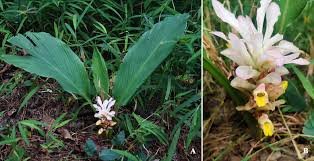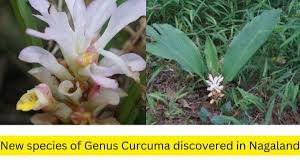New Species of Genus Curcuma Discovered in Nagaland
Discovery of a New Species
In a significant botanical breakthrough, scientists have identified a new species of the genus Curcuma in Nagaland, India. This newly discovered species, named Curcuma nagalensis, was found in the lush forests of the region, which are known for their rich biodiversity. The discovery was made by a team of researchers from the Botanical Survey of India (BSI) during an extensive survey aimed at cataloging the unique flora of the Northeast Indian states.
Characteristics of Curcuma nagalensis
Curcuma nagalensis exhibits several distinctive features that set it apart from other species within the Curcuma genus. Notably, it has vibrant yellow flowers with intricate patterns and a unique leaf structure that includes a distinctive reddish-purple hue on the underside. These characteristics contribute to its identification and classification as a separate species. The plant typically grows in moist, shaded environments, which are common in Nagaland’s forested areas.
Ecological Significance
The discovery of Curcuma nagalensis highlights the ecological significance of Nagaland’s forest ecosystems. These forests are not only home to diverse plant species but also play a crucial role in maintaining the region’s ecological balance. The presence of new species like Curcuma nagalensis underscores the importance of preserving these habitats to ensure the survival of unique flora and fauna.
Implications for Conservation
The identification of this new species has important implications for conservation efforts in the region. It emphasizes the need for continued research and conservation initiatives to protect Nagaland’s rich biodiversity. By understanding and documenting the diverse plant life, conservationists can better address the challenges facing these ecosystems and develop effective strategies to safeguard them.
Future Research and Exploration
The discovery of Curcuma nagalensis opens up new avenues for research in the field of botany. Further studies are expected to explore the plant’s medicinal properties, ecological role, and potential uses. Researchers are also interested in investigating the genetic diversity of Curcuma species in the region to gain deeper insights into their evolution and adaptation mechanisms.

Why This News Is Important
Highlighting Biodiversity
The discovery of Curcuma nagalensis is a testament to the rich biodiversity of Nagaland. It showcases the untapped potential of the region’s flora and the importance of ongoing botanical exploration. Such discoveries not only enrich scientific knowledge but also emphasize the need for conservation efforts to protect these unique species and their habitats.
Conservation Efforts
This discovery underscores the urgent need for conservation initiatives in Nagaland’s forest ecosystems. By identifying new species and understanding their ecological roles, conservationists can develop targeted strategies to preserve these environments and ensure the survival of diverse plant species.
Enhancing Scientific Knowledge
The identification of a new species adds valuable information to the scientific community’s understanding of the Curcuma genus. It provides insights into the plant’s unique characteristics and potential applications, contributing to broader knowledge in the fields of botany and ecology.
Promoting Research and Exploration
The discovery encourages further research and exploration in Nagaland and other biodiversity-rich regions. It highlights the importance of continued field studies to uncover and document new species, which can lead to advancements in various scientific disciplines and applications.
Raising Awareness
By bringing attention to the discovery of Curcuma nagalensis, this news helps raise awareness about the importance of preserving biodiversity. It serves as a reminder of the value of protecting natural habitats and the myriad of species they support.
Historical Context: Botanical Exploration in Nagaland
Nagaland, located in Northeast India, is renowned for its rich biodiversity and varied ecosystems. The region’s unique climate and geographical features create ideal conditions for a wide range of plant species. Botanical exploration in Nagaland has a long history, with numerous discoveries contributing to the global understanding of plant diversity.
Historically, botanists and researchers have been drawn to Nagaland for its untapped potential and the discovery of numerous plant species. The recent identification of Curcuma nagalensis continues this tradition of exploring and documenting the region’s flora, further establishing Nagaland as a hotspot for botanical research.
Key Takeaways from the Discovery of Curcuma nagalensis
| Serial Number | Key Takeaway |
|---|---|
| 1 | A new species of the genus Curcuma, named Curcuma nagalensis, has been discovered in Nagaland. |
| 2 | Curcuma nagalensis is characterized by its vibrant yellow flowers and unique leaf structure. |
| 3 | The discovery highlights the ecological significance of Nagaland’s forest ecosystems. |
| 4 | The identification of this species underscores the need for conservation efforts to protect biodiversity. |
| 5 | Future research may explore the medicinal properties and ecological roles of Curcuma nagalensis. |
Important FAQs for Students from this News
1. What is Curcuma nagalensis?
Curcuma nagalensis is a newly discovered species of the genus Curcuma, identified in Nagaland, India. It is characterized by its vibrant yellow flowers and unique leaf structure.
2. Where was Curcuma nagalensis discovered?
The new species was discovered in the forested regions of Nagaland, a state in Northeast India known for its rich biodiversity.
3. Why is the discovery of Curcuma nagalensis significant?
The discovery is significant because it highlights the rich biodiversity of Nagaland and underscores the importance of conserving the region’s unique flora and habitats.
4. What are the key features of Curcuma nagalensis?
Curcuma nagalensis features vibrant yellow flowers with intricate patterns and leaves with a reddish-purple underside, distinguishing it from other species in the Curcuma genus.
5. How does the discovery impact conservation efforts?
The identification of Curcuma nagalensis emphasizes the need for targeted conservation efforts in Nagaland to protect its unique ecosystems and the diverse plant species that inhabit them.
Some Important Current Affairs Links



















 Exciting News!
Exciting News!  Join Our Telegram Channel Now!
Join Our Telegram Channel Now!
 Join our Telegram channel for a thrilling adventure into the world of daily current affairs.
Join our Telegram channel for a thrilling adventure into the world of daily current affairs. 
 Don’t miss out on the latest updates and insights! Click to join now and be part of the knowledge revolution!
Don’t miss out on the latest updates and insights! Click to join now and be part of the knowledge revolution! 
